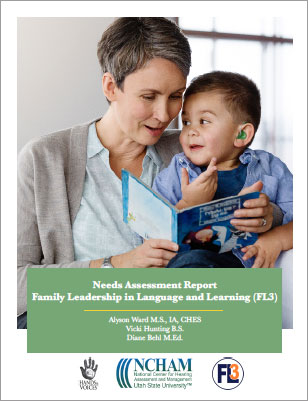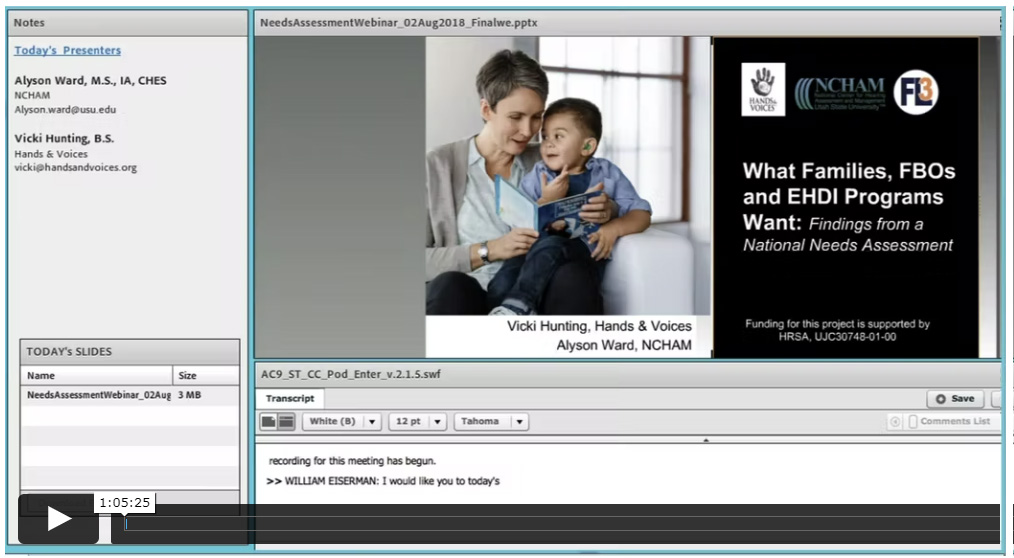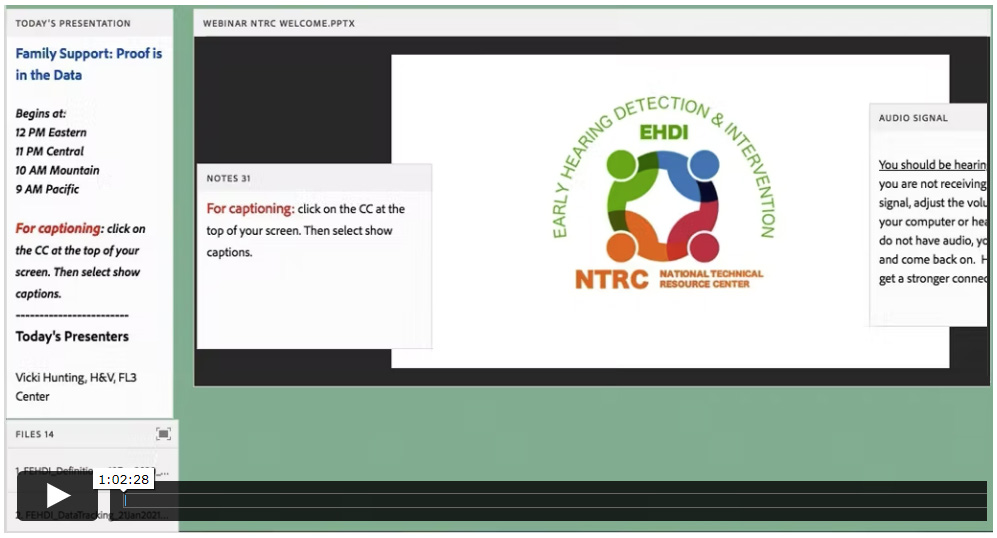Data to Impact
- National Needs Assessment
- Family EHDI (FEHDI) Data Project
- H&V Demographics Data
- H&V Chapter and Program Data
- H&V Annual Report
Hands & Voices uses data to examine the effectiveness and efficiency of our organization. Systemic, Programmatic and organizational evaluation is key to the work at Hands & Voices to ensure the integrity of our efforts. We are committed to collecting, analyzing and sharing our data to improve our work, and to share models data collection that others can also use.
Below are five aspects of Data to Impact at Hands & Voices.
National Needs Assessment

“How do you know what families need or want?” This is a question that has come up time and again over the years at Hands & Voices (H&V). For me, the answer has always been pretty simple. We know what families need/want, because we ARE families at H&V. Our entire staff at H&V Headquarters are parents, and/or Deaf individuals and we represent and work with literally 1000’s of parents and parent leaders from around the globe every year. However, it is one thing to have an innate, and subjective sense of what our collective voices say and believe on any given topic and quantifying that understanding through objective and thorough measurements with the national needs assessment. That is why we are so pleased to be able to present this report to reflect on the voices of not only parents who are currently in the ‘system’ receiving supports, but also the parent leaders, parent support organizations, and EHDI system stakeholders who contribute to the success of families navigating their way towards ensuring the goal of children reaching their full potential. We hope that this information can effectively guide and support your efforts so that ultimately the systems of care in place for families and their children, will be appropriate and effective!
– Janet DesGeorges, Executive Director of Hands & Voices
Hands & Voices recently completed a comprehensive national needs assessment to guide its work on meeting the objectives of the newly formed Family Leadership in Language and Learning (FL3) program, a cooperative agreement with the Health Resources and Services Administration (HRSA) in 2017. The needs assessment was designed to take an in-depth look at the needs of families with children who are deaf or hard of hearing (D/HH), family-based support organizations, and state/territory EHDI programs in their ability to work in partnership to improve the EHDI service system. Hands & Voices contracted with the National Center for Hearing Assessment and Management (NCHAM) at Utah State University to conduct these efforts.
Information learned from this needs assessment will be used by the FL3 to build a portfolio of trainings, educational materials, resources, etc., to support family partnership, engagement, and leadership within the EHDI system; and to inform and shape support, family education, and mentorship activities. The needs assessment results provide input to the following questions from three target populations; parents with children who are D/HH age 0-6, family-based organizations, and EHDI Coordinators):
- What types of support did families receive or wish they had when their child was diagnosed as deaf or hard of hearing?
- What do family support organizations need from the FL3 program to better serve families who have a child who is D/HH?
- What are the supports EHDI programs need for effective family engagement in ensuring the EHDI programs meet the needs of all families of children who are or are at risk for being D/HH?
Access the full report
Link to full Press Release
What Families, FBOs & EHdi Programs Want: Findings from a National Needs Assessment
A Webinar from August 2, 2018
Presenters:
Alyson Ward, M.S., IA, CHES - NCHAM
Vicki Hunting, B.S. - Hands & Voices
Vol. 4, Iss. 3 (2019) of The Journal of Early Hearing Detection and Intervention (JEHDI) was released in December 2019. In this issue included an article titled Supporting Families of a Deaf or Hard of Hearing Child: Key Findings from a National Needs Assessment, Alyson C. Ward, Vicki Hunting, and Diane D. Behl. This article focuses specifically on the answers to 2 questions from the National Needs Assessment; what types of support did families receive or wish they had received when their child was diagnosed as DHH and what are EHDI programs and FBOs doing to support parents?
Click on this link to download the full article and learn about the Key findings. https://digitalcommons.usu.edu/cgi/viewcontent.cgi?article=1105&context=jehdi.
Recommended Citation
Ward, A. C. Hunting, V. & Behl, D. D. (2019). Supporting Families of a Deaf or Hard of Hearing Child: Key Findings from a National Needs Assessment. Journal of Early Hearing Detection and Intervention, 4(3). DOI: https://doi.org/10.26077/5f99-5346
Retrieved from https://digitalcommons.usu.edu/jehdi/vol4/iss3/6
Family EHDI (FEHDI) Data Project
The Family Early Hearing Detection and Intervention (FEHDI) project was initiated to assist EHDI Programs and Family-based Organizations (FBOs) to outline and test definitions to meet the HRSA objective to “Increase by 20 percent from baseline the number of families enrolled in family-to-family support services by no later than 6 months of age.”. This included work to identify data fields that the EHDI programs needed to monitor enrollment in family support as well as well as outline specific data needed by FBOs to be able to provide data back to EHDI programs on the work they are doing to support families.
Tools developed:
FEHDI Definitions Dec. 10, 2020 (pdf)
FEHDI DataTracking Jan 21, 2021 (pdf)
Family Support: Proof is in the Data (FEHDI Webinar 7/27/2021)
This Family EHDI Data Learning Community (FEHDI) webinar, hosted by NCHAM and the FL3 Center, provides an opportunity for EHDI Programs and Family-based Organizations (FBOs) to have discussions about how and what data to track/report for the 2020 HRSA Objective “increase by 20 percent (from year one baseline), the number of families enrolled in family-to-family support services by no later than 6 months of age.”
Presenters: Vicki Hunting, H&V / FL3 Center
Impact of Family Support and Engagement (IFSE)
In 2022, the FL3 Center and NTRC led a learning community comprised of seven Family-Based Organizations and their partnering EHDI programs. The purpose of the learning community was to determine the most important domains of family-to-family support and how to measure those domains through a survey. The constructs of Well-Being, Knowledge, and Empowerment from the Conceptual Framework of Parent-to-Parent Support for Parents of Children Who Are Deaf or Hard of Hearing by Henderson, Johnson, and Moodie was used to design the survey. The aim of the IFSE Learning Community was to develop and test a survey that measures the impact of family-to-family support for families with children who are DHH. The final results of the Learning Community includes a Question Bank of Family-to-Family Support Impact Questions.
Measuring the Impact of Family-to-Family Support: Tools and Lessons Learned from a Learning Community Webinar
11/10/22
[ Watch the Video ]
H&V Demographics Data – Are you being served?
In 2021 and 2022 the FL3 Center polled anyone who had contact with or attended a session (webinar, education, and/or training session) that was hosted by the H&V FL3 Center. We strive to engage a diverse audience, so this feedback is helpful to us in understanding who we are reaching through these events and assist us with identifying populations where we need to improve our outreach efforts. This information also helps us to understand how we reflect the communities we serve, equip our staff with data to better serve the needs of our communities, continue to grow family leaders and show progress with our board, funders and communities.
Hands & Voices Chapter & Program Data
Annually all H&V Authorized Chapters and Programs are required to provide data reports to H&V Headquarters (HQ). These fields help HQ understand adherence to practices, policies and procedures outlined in the annual Memorandum of Understanding (MOU). The information gathered will help H&V HQ be more specific about all work with families served, help us to better quantify our work to future funders and local constituents. We understand that Chapters and Programs differ in the supports, resources and services they provide to families, and many are all volunteer organizations so we ask them to do the best they can to complete the fields and ensure their future data gathering includes goals about how they will track this required information in the future.
2021_HV_DataReport_14Jun2022.pdf
2020_HV_DataReport_31Aug2021.pdf
2019_HV_DataReport_29Oct2020.pdf
2018_HV_DataReport_11Sept2019.pdf
Hands & Voices Annual Report
For a complete view of the last years activities at Hands & Voices please go to our Annual Report Download page and there you can download and read our Annual Report


